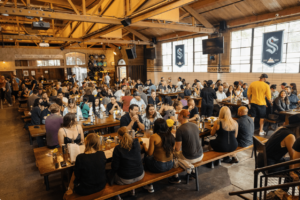There is no sweeter phrase for an event creator than “sold out,” but did you know that by selling different types of tickets, you can hear that phrase more than once?
Attendees experience serious FOMO (fear of missing out) when they see tickets for an event are sold out. When you use different ticket types throughout your sale, your attendees will see those magic words each time a type sells out. This increased perceived value of your event will show your attendees that it’s in high demand.
Not sure what event ticket pricing strategies are right for you, or how to name a type of ticket? Here are eight common event ticket types and why you should use them.
#1: General admission
The most common ticket-selling strategy is used by almost every event for the bulk of admissions.
What is a general admission ticket?
The general admission (GA) ticket type provides admission to your event without any extras. GA advance tickets are typically on sale for the longest time period, and are usually one of the least expensive types of tickets you offer.
Why use it: General admission provides a baseline experience for attendees and is a staple in every concert ticket pricing strategy. It also helps you convert people who don’t want — or don’t want to pay for — a VIP experience.
#2: VIP
Premium ticket tiers can help you attract new attendees — and make more money from your current audience.
What are VIP tickets?
VIP packages let you offer attendees the exact experience they’re looking for, at the exact price they’re willing to pay. Premium ticket tiers can help you attract new attendees — and make more money from your current audience. VIP ticket packages often include extras such as premium seating or entrance to an exclusive meet-and-greet with the event speaker or entertainment. If you have the resources to provide this premium experience, this is the second most important type of ticket for driving revenue after GA.
#3: Reserved seating
Reserved seating tickets are a simple upgrade that can provide big value for attendees wanting to be closer to a performer or speaker at your event.
Why use it: The people who want to be near the action will pay more for the privilege. So if your venue uses seating, you can charge more for the section closest to the performer or stage.
#4: Multi-day pass
If your event takes place over several days, give attendees the power to pick and choose the days they will attend. Radio frequency identification (RFID) makes this type of ticket super easy to manage on the logistics side, so you don’t have to worry about the complexity of different variables.
Why use it: A multi-day pass removes attendance barriers by letting people choose which sessions or performances they attend, at the price they’re comfortable with.
#5: One-day pass
Like a multi-day pass, a one-day pass lets you expand your ticket-selling strategy. This option lets you give attendees digital or in-person access to your event for one day, rather than every day of your multi-day event.
Why use it: Some corporate conferences or multi-day festivals can pose a price challenge or scheduling conflict for interested people. Overcome both hurdles with a day-pass ticket option, so attendees can join for just the amount of time they desire.
#6: Early bird discount
This strategy is most often used to give people the largest discount possible on tickets through a predetermined pre-sale period. You can decide how long the early bird lasts and how much of a discount you want to offer attendees at your ticketed event. Providing a discount is a great way to honour those who click first.
Why use it: For loyal fans or potential attendees, an early bird discount often provides enough of an incentive to convince them to save their spot before general admission opens up. This ticket-selling strategy also gives you a better idea of the number of committed attendees, which is helpful for venue and catering counts.
#7: Coded discount
Targeted discounts give specific groups of attendees the option to purchase different types of tickets at a reduced price with a special promotional code. It’s a great way to kick off your pre-sale for return attendees, offer last-minute discounts, or partner with vendors to encourage at-event spending.
Why use it: Discounts allow you to woo back past attendees, offer bulk discounts on ticket purchases from specific groups, and motivate recipients to act by a certain date.
#8: Tickets at the door
No matter how great your marketing strategy for selling tickets is or what kinds of discounts you offer, there will always be some potential attendees who will wait until the very last minute to purchase tickets. Make extra sales on the day by allowing attendees to purchase tickets at the door.
Why use it: If you haven’t managed to sell out your event in advance, these tickets can help fill empty spots. People buying tickets at the door also know they aren’t getting any early bird discounts, and you can charge full price.
Next step: Pricing your tickets to make the most money
Once you decide which types of tickets you want to offer, the next (and perhaps most critical step) is pricing them. Get insider pricing knowledge from Eventbrite’s Chief Financial Officer and Head of Commercial Strategy in Your Value-Based Pricing Strategy: How to Price Your Event.
Ready to make some tickets? Explore the Eventbrite ticket types available and start selling tickets to your events online.






